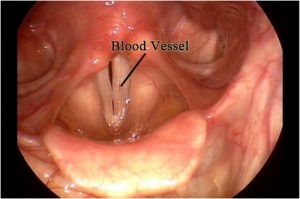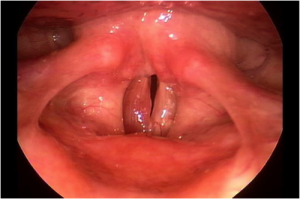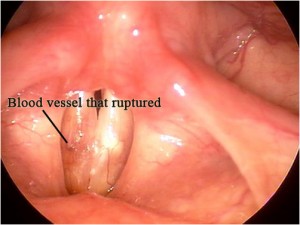- Question: How do the ingredients in e-cigarettes and vaporizers affect respiratory health? - August 16, 2019
- Bad Technique and Vocal Injury - January 9, 2019
- Is Edible Marijuana Dangerous for the Voice? Myths Dispelled - December 18, 2018
- Surprise! You have a hemorrhage - January 31, 2018
- Graves’ Disease: Treatment Overview - September 25, 2017
- Adele and the Stigma of Vocal Injury - July 11, 2017
- Vocal Curbside Consult: How does the thyroid affect the voice? - May 16, 2017
- Vocal Curbside Consult: How do hormones affect the voice? - May 3, 2017
- Vocal Curbside Consult: How do emotion and stress affect the voice? - April 17, 2017
- Vocal Curbside Consult: Vocal Recovery After Illness - April 7, 2017
Tip # 6: It is possible to prevent a vocal hemorrhage
This weekend, I had the pleasure of lecturing the Los Angeles Young Men’s Ensemble. I quickly learned that vocal hemorrhage is a real fear among singers. In a lecture on Vocal Health and the Singing Voice, I presented various tips for protecting a singer’s voice. I later discussed potential injuries and their treatments.

When I opened for questions, six young hands were raised. After ten requests that I go back to the slide about hemorrhages, I began to understand more about how singers perceive this problem.
Considering how rare a real vocal hemorrhage (also known as a “blown out” voice, or a vocal “bruise”) is, I am always surprised by how much singers think about it. Also, considering a vocal hemorrhage is pretty easily prevented and treated, I usually downplay this complication. But I now know how important it is to discuss.
What is a vocal hemorrhage?
A vocal hemorrhage occurs when a small blood vessel located within the vocal fold bursts. This results in blood leaking into the vocal fold and occurs with forceful, aggressive, or incorrect voice use.

What does that mean?
It is like a bruise anywhere else on your body. If you bang your head on the car door, blood vessels in your skin will break and they will leak blood into your skin. The resulting purplish bump slowly heals itself, as long as you do not continue to hit it. Over a week, the purple becomes more yellow and then slowly completely dissipates.
The same is true of a vocal hemorrhage. Once the blood vessel ruptures and blood has leaked into the vocal fold, all that is usually needed is avoiding “hitting” your vocal fold again. In this case, that means complete voice rest for a week while the blood reabsorbs. If you rest completely for that week, you should have no negative consequences. If you don’t rest, the blood will persist and cause scarring.
How do I know if I’ve had a hemorrhage?
- Sudden hoarseness (#1)
- Loss of range
- Pain
- Need to push through performance
- Voice fatigue
What other things can cause these symptoms?
Very few other things can cause sudden hoarseness. You should always seek professional evaluation for sudden hoarseness because this usually does mean a hemorrhage.
What are the complications?
If you ignore your symptoms or you are not diagnosed correctly, you risk permanent vocal scarring. Scarring will result in permanent decreased range and permanent hoarseness.
How do I get diagnosed?
Usually, flexible laryngoscopy alone, by a trained laryngologist is all that is required. However, stroboscopy is very helpful for prognosis and to determine what stage of healing you are in.
Who is at risk for a vocal hemorrhage? Am I at risk?
You are at risk for hemorrhage if you have a large blood vessel in your vocal fold. These form with significant voice use. You can only know if you have a vessel like this if you have a stroboscopy.

The only way to know you are at risk is to have a baseline stroboscopy. I also recommend a repeat stroboscopy before major performances. A strobe will identify vessels before they rupture, so that you can take the necessary precautions. This will prevent hemorrhage and resulting cancelled performances and cancelled tours with lost revenue. More importantly, it will prevent permanent hoarseness.
What is the treatment?
The only real treatment is voice rest. Very rarely a procedure is needed when there is too much blood in the vocal fold. However, more commonly, strict voice rest (i.e., no speaking, singing, whispering, throat clearing, etc) is the only thing that is required.
|
|
|
While in the above pictures, it is clear that there was a hemorrhage and that it is not completely resolved, the offending vessel is easily seen. This may need to be treated with a surgical procedure to seal it, preventing further bleeds.
How do I prevent a hemorrhage?
There are many things you can do to prevent a vocal hemorrhage:
- Hydrate well
- Learn perfect vocal technique (voice lessons)
- Have periodic voice checks (to identify at risk blood vessels)
- Keep your voice environment clean (no smoking, no medical problems affecting your voice, clean performance space, etc)
- Avoid steroids
- Avoid pushing your voice
- Take care when singing while pre-menstrual
What do I do if I have a big vessel?
Preventing rupture with the above techniques is important. If you hemorrhage despite these measures, you may need to have the vessel sealed surgically by a laryngologist.
To learn more about Dr. Reena Gupta or proper vocal care, visit: http://www.voicedoctorla.com/
Contact a Physician at Osborne Head & Neck Institute
If you would like to speak with one of our physicians regarding this issue or another ear, nose, throat problem; or have other questions or concerns, please complete the contact form below or call us at 310-657-0123.





